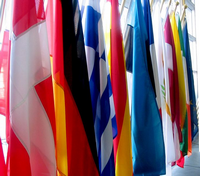Now that Ireland and Poland have ratified the Lisbon Treaty, a document designed to fundamentally re-engineer the 27-member European Union, Czech President Vaclav Klaus is the only remaining holdout. If Klaus gives in and signs the document, as he is largely expected to do, the Treaty will go into effect on Jan. 1, 2010, ushering in profound changes in the way the EU operates, especially on the global stage.
Up until now, the EU has been stymied in its efforts to exert more influence in international affairs, largely because of its inability to "speak with one voice," especially on matters of foreign policy. The Lisbon Treaty is designed to remedy this institutional problem by centralizing key elements of European foreign policymaking in Brussels, in particular through the creation of two top EU jobs, colloquially known as the EU president and the EU foreign minister.
Empowered by the Treaty to unify the myriad competing foreign policy interests of the individual EU member states, these two high-power, high-profile positions will have the potential to completely remake the EU's global image and, over time, to significantly boost the EU's global clout.

